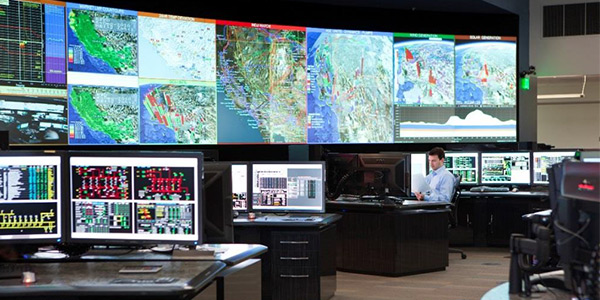Having become reliability coordinator of record for much of the West on Nov. 1, CAISO’s RC West is now taking on new responsibilities as time error and geomagnetic disturbance (GMD) monitor for the Western Electric Coordinating Council.
“The transition [to RC of record] went very smooth,” Tim Beach, director of RC West operations, said Tuesday during a meeting of the RC West Oversight Committee. “We have not had any real events happen since then, so that’s good.”
“The communications with [balancing authorities] and [transmission operators] have been strong,” Beach added, noting that the RC now conducts a daily conference call with the Northwest region in addition to the one CAISO has held for the Southwest for years. The calls, which deal with path deratings, interconnection reliability operating limits (IROLs), major facility outages and remedial action scheme (RAS) outages, if they take place, “keeps everybody on the same page,” Beach said.
“It’s new to the folks in the Northwest. And a lot of times there isn’t a lot of discussion on these calls so there’s a question of value. But we are going to continue that call through the end of the year and we’ll reevaluate the process,” he continued. “We’ll always have some sort of call with regard to that because we do need to communicate those IROLs and path derates.
Beach said NERC became time error monitor for WECC at 10:30 a.m. on Nov. 18. “We haven’t had a manual time error for reliability reasons in the West in quite some time and frankly we don’t see that happening, but we have the process in place if it were to occur,” he said.
RC West will take its turn as the GMD monitor on Dec. 3 when SPP becomes RC of record for the remaining Peak Reliability area. It will serve in the role through 2020, with BC Hydro RC (BCRC) becoming the monitor for 2021. Transitions under the rotation, which will also include SPP and Alberta Electric System Operator, will occur at the same time as the Eastern Interconnection makes its switches, Beach said.
Proposed Metrics
Dede Subatki, director of operations engineering services, told members the deadline is Nov. 29 for comments on RC West’s proposed data metrics.
RC West has proposed continuing Peak Reliability’s practices of releasing some data publicly (such as state estimator quality and convergence) and keeping other data (e.g., load forecast accuracy) confidential.
The Real-Time Working Group will meet Dec. 5 to discuss the comments and Dec. 19 to finalize the metrics, with plans to start gathering data Jan. 1.
“I have a little bit of concern about whether [state estimator] quality should be public at this point given our confidence in it,” John Nierenberg of Tacoma Power said when Subatki opened the floor to comments.
Subatki said the public release would be a “generalized SE quality metric” for the RC West footprint. SE data for individual transmission operators, he said “is definitely confidential.”
That appeared to satisfy Nierenberg. “If we look at an overall generic [metric] maybe I’m not as concerned,” he said.
EHV Data Pool Closure, PMU Update
Officials warned members that companies needing to pull historical data from Peak must do so before Dec. 3, when it will shut down its IT infrastructure, including its EHV Data Sharing Pool. It is being replaced by the new Western Data Sharing Pool (WDSP), which has been available since the end of October.
“The deadline is something that is beyond our control and is something that is not negotiable,” said Subatki. “I think it’s really important to get through the denial phase that some people think we can actually extend this beyond Dec. 3.”
Beach provided an update on the transition to the new Western Interconnection Synchrophasor Program (WISP), saying nine entities, including RC West, SPP, and BC Hydro have completed the transition with six others having completed circuits and ready for the cutover. PacifiCorp, Los Angeles Department of Water and Power and Tucson Electric Power are not yet ready.
Change to Leadership Terms
The committee agreed to eliminate staggered terms for its leadership to fix an unexpected problem.
Under the change, Chair Michelle Cathcart and Vice Chair Kristie Cocco will serve their terms through May 2020 instead of the original plan to have their terms end in March.
Cathcart, vice president of transmission system operations with the Bonneville Power Administration, was elected along with Vice Chair Steve Cobb, director of transmission and generation operations at Salt River Project (SRP), at the committee’s first meeting in March 2019.
Because Cobb is retiring at the end of the year, the committee at its last meeting elected Cocco, of Arizona Public Service, to replace him.
In June 2020, both the new chair and new vice chair will begin two-year terms.
“We realized that because we had said there were staggered terms, it made it so that the vice chair couldn’t become the chair because their term would be in the middle when the chair’s term started,” explained Cathcart. “Given the timeframe and making sure that Kristie has a little bit of time under her belt before she actually becomes chair, we thought that making the change in June would … give her a little bit of time. And then hopefully we can stay on a June schedule from here on out.”
Cathcart clarified after the meeting that “while Kristie is a strong candidate for chair at that point, there will be an election of both chair and vice chair.”
The committee also approved a resolution of appreciation for Cobb, who is retiring after almost 40 years with SRP.
Schedule
The committee will hold a webinar Dec. 17, at which it will review the wind down of Peak. The committee will meet quarterly or as needed in 2020. Meetings are currently set for: Feb. 27 (webinar); May 12 (in person and webinar); Aug. 19 (webinar) and Nov. 12 (in person and webinar).
– Rich Heidorn Jr.








